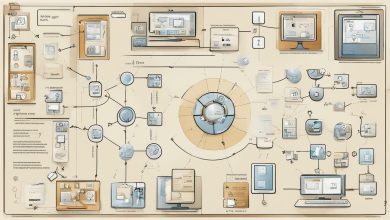
Efficient coding is a crucial aspect of every developer’s job, especially when it comes to building and debugging projects. The faster you can code, the quicker you can complete a project. That’s why the concept of speed coding is gaining popularity in the developer community. With the right techniques, developers can accelerate their coding speed and optimize their projects for rapid development.
In this article, we will explore the fundamentals of speed coding and discuss some of the most effective coding hacks to help you build and debug your projects faster. We will also cover the tools and techniques that can streamline your development workflow and improve project efficiency. By the end of this article, you will have a good understanding of how to use speed coding to your advantage and optimize your coding skills.
Key Takeaways:
- Speed coding is a technique used to optimize coding efficiency and build projects faster.
- Efficient coding techniques such as modular programming and code reusability are essential for speed coding.
- The use of integrated development environments, keyboard shortcuts, and code snippets can significantly speed up programming tasks.
- Effective debugging techniques such as log analysis, error tracking tools, and unit testing can help identify and fix issues quickly.
- Coding hacks such as code generation, automation tools, and efficient algorithms can accelerate the development process.
- Speed coding can lead to rapid prototyping and project optimization, enhancing productivity and improving coding skills.
Understanding the fundamentals of Speed coding
Speed coding is all about working efficiently to optimize your development process. Here are some fundamental techniques every developer should know:
Modular Programming
Breaking down a project into smaller modules makes development easier to manage. It also allows you to reuse code for similar projects, saving time and increasing productivity.
Code Reusability
Reusing code is essential for efficient coding. Instead of writing the same code multiple times, create a library of reusable code snippets. This allows you to work faster and spend more time on complex features.
Efficient debugging practices
Debugging is a significant part of the development process, but it can be time-consuming. Knowing efficient debugging practices, such as placing breakpoints in your code, can help reduce debugging time and speed up development.
Project Optimization
Optimizing your project is key to maximizing productivity and minimizing errors. Some optimization techniques include compressing images, minifying CSS and JavaScript files, and using a content delivery network.
Examples
For example, using a CSS framework like Bootstrap allows you to quickly build responsive websites by reusing predefined components. Similarly, using version control tools such as Git can save time by allowing you to collaborate with others on a project and easily track changes to your code.
Streamlining Your Development Workflow
Speed coding is all about working smarter, not harder. By streamlining your development workflow, you can significantly increase your coding speed and productivity.
Use Integrated Development Environments (IDEs)
An IDE is an all-in-one software solution that provides a code editor, compiler, and debugger in a single interface. This can save you time and effort by eliminating the need to switch between different applications. Popular IDEs that support multiple programming languages include Visual Studio Code, IntelliJ IDEA, and Eclipse.
Master Keyboard Shortcuts
Keyboard shortcuts are a must for any speed coder. Learning to navigate your code editor without using a mouse or trackpad can save you valuable time. Common shortcuts include Ctrl + C and Ctrl + V for copying and pasting, Ctrl + Z for undoing changes, and Ctrl + F for finding specific pieces of code.
Utilize Code Snippets
A code snippet is a reusable piece of code that can be inserted into your program. They can save you time by eliminating the need to rewrite common code blocks. Many code editors provide built-in snippets, but you can also create your own.
Optimizing Project Debugging
Debugging is an essential part of the coding process and can often be time-consuming. However, with the right techniques and tools, debugging can be done efficiently without causing a significant delay in project delivery. Here are some tips to help you debug your projects quickly and effectively:
Log Analysis
When debugging, it’s important to have a clear understanding of the issues you’re facing. One effective way to do this is by analyzing logs. Logs provide a detailed record of the actions taken by the system during the execution of the project, making it easier to identify the source of the issue. By understanding the logs, you can identify patterns and trends that might be causing the problem.
Error Tracking Tools
Using error tracking tools like Sentry or Bugsnag can be incredibly useful for debugging. These tools provide real-time alerts when an error occurs, making it easier to identify and fix issues as they arise. They also provide detailed error reports that can be used to reproduce and debug the issue effectively.
Unit Testing
Unit testing is a process in which individual units or components of a project are tested to ensure that they are functioning correctly. By breaking the project into smaller components and testing them individually, it becomes easier to identify and fix issues. Unit testing can also help prevent errors from occurring in the first place, reducing the need for extensive debugging later on.
Efficient Debugging
Debugging can be time-consuming, but it doesn’t have to be. By following efficient debugging techniques, you can quickly identify and fix issues without causing unnecessary delays. One effective method is to use print statements to track the flow of the code. This can help you pinpoint the exact source of the issue and eliminate the need for extensive debugging.
By using effective debugging techniques, you can minimize the time spent fixing issues and optimize your project delivery timelines. With the right approach, debugging can be done efficiently without compromising the quality of your work.
Leveraging Coding Hacks for Rapid Development
When it comes to rapid development, coding hacks can be a lifesaver for programmers who are looking to save time and boost productivity. These clever techniques can help you write cleaner, more efficient code in less time. Here are some of the most effective coding hacks you can use to speed up your development process:
- Code Generation: Tools like Yeoman and CodeIgniter can help you generate pre-written code for your projects. This can save you a lot of time, especially for repetitive tasks.
- Automation Tools: Tools like Grunt and Gulp can automate tasks like testing, minification, and deployment. This can help you streamline your workflow and save countless hours of manual labor.
- Efficient Algorithms: By using more efficient algorithms, you can significantly speed up your code. For example, using binary search instead of linear search can dramatically reduce search times for large data sets.
By leveraging these coding hacks, you can build projects more quickly and effectively, without sacrificing quality. However, it’s important to remember that these tools are not a substitute for good coding practices. Always strive to write clean, maintainable code, and use coding hacks to enhance your productivity, not as a crutch.
Conclusion
Speed coding has become an essential skill for developers seeking to optimize their productivity and enhance their coding skills. By adopting efficient coding techniques, developers can rapidly build and debug their projects, leading to rapid prototyping and project optimization.
As discussed in this article, understanding the fundamentals of speed coding, streamlining the development workflow, optimizing project debugging, and leveraging coding hacks are key principles to maximizing productivity. By implementing these techniques, developers can significantly speed up programming tasks and minimize downtime during the development process.
Rapid prototyping is critical for developers and businesses alike. With speed coding, developers can quickly produce prototypes and test them in the real world. This approach allows both developers and businesses to rapidly iterate through ideas and refine their products, leading to a more efficient development process and ultimately, a better outcome.
In conclusion, speed coding is an invaluable skill for developers seeking to optimize their productivity and enhance their coding skills. By adopting speed coding techniques, developers can rapidly build and debug their projects, leading to rapid prototyping and project optimization. So, what are you waiting for? Start speed coding today and take your skills to the next level.
FAQ
Q: What is speed coding?
A: Speed coding refers to the practice of employing efficient coding techniques to rapidly build and debug projects. It involves utilizing various strategies and tools to streamline the development workflow and optimize project efficiency.
Q: How can speed coding benefit developers?
A: Speed coding allows developers to quickly prototype and optimize projects, saving valuable time and resources. By using efficient coding techniques, developers can accelerate the development process and meet project deadlines more effectively.
Q: What are some fundamental principles of speed coding?
A: Some fundamental principles of speed coding include modular programming, code reusability, and efficient debugging practices. These techniques enhance coding speed and project efficiency by promoting clean and organized code and minimizing errors.
Q: How can I streamline my development workflow?
A: You can streamline your development workflow by utilizing integrated development environments (IDEs), keyboard shortcuts, and code snippets. These tools and techniques help automate repetitive tasks and increase coding speed and efficiency.
Q: What are some effective techniques for project debugging?
A: Effective techniques for project debugging include log analysis, error tracking tools, and unit testing. These methods help identify and fix coding errors and issues, reducing downtime and improving the overall quality of the project.
Q: What are coding hacks and how can they accelerate development?
A: Coding hacks are advanced techniques and shortcuts that can significantly speed up the development process. They often involve code generation, automation tools, and efficient algorithms, allowing developers to quickly and effectively build projects.
Q: Why should developers adopt speed coding techniques?
A: Developers should adopt speed coding techniques to enhance their productivity and coding skills. Speed coding enables rapid prototyping, efficient project development, and timely delivery of projects, benefiting both developers and businesses.







